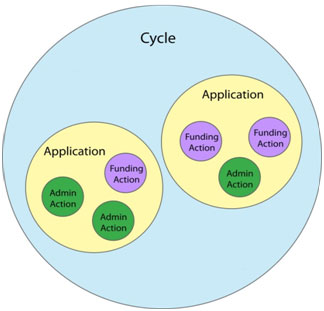Grant and Contract Accounting (GCA) staff use SERA (System for Electronic Research Accounting) to view and process items related to the awarded proposals. From within SERA, they can access Funding Actions (FA), Post-Award Changes (PAC), and Advance Budget Number Requests (ADV). From an FA, the GCA staff can see a read-only version of the parent application, and view its attachments.
The following image shows the SERA “tabs.”

GCA staff is responsible for creating grant award budgets in the financial system based on either FAs sent by OSP or advance budget requests sent by campus. They also process any administrative changes as indicated by a PAC.
To use SERA, a GCA ASTRA Administrator must give the staff person an appropriate GCA role.
OSP staff use SPAERC (Sponsored Projects Administration & Electronic Research Compliance) to:
- Review and approve applications
- Create funding and administrative actions
- Manage subawards
- Organize related applications, subawards, and actions into cycles.
The following image shows the SPAERC “tabs” for accessing items.

To use SPAERC, one of the OSP ASTRA administrators must give you access. There are several OSP roles available:
- OSP Administrator is for OSP staff in general
- OSP Subcontracts is for OSP staff in the subcontracts group
- OSP System Administrator has additional authority and is limited to a few OSP staff
- SPAERC Read-Only is for central office employees outside of OSP who need to view applications and related items
The research team uses SAGE (System to Administer Grants Electronically) for preparing the proposal application and its budget, approving the application, requesting advance budget numbers, and creating any related subawards.
SAGE has five tabs, as shown in the following image.

The SAGE tabs are:
- The Budgets tab allows preparers to create a detailed budget for the entire proposal time period, including sub budgets. They can optionally link a budget to an eGC1, and use it for the initial submission to the sponsor, and subsequent renewals. Budget IDs have a prefix of B.
- The eGC1 Forms tab allows preparers to create the application, link a budget if desired, and attach the sponsor documents. Application IDs have a prefix of A.
- The Approvals tab provides reviewers a list of applications to review and approve, or to return to preparers for revision.
- The Advances tab allows preparers to request an advance budget number for Approved or Awarded applications which OSP has marked as eligible for an advance. Advance IDs have a prefix of ADV.
- The Subawards tab allows the creation of new subaward requests, or modifications of existing subawards.
To use SAGE, campus personnel need authorization. This is done through the university’s ASTRA (Access to Systems, Tools, Resources and Applications) system.
Generally, departmental ASTRA administrators assign the following SAGE roles:
- Principal Investigator to researchers, based on each department’s criteria
- Proposal Preparer to research administrators
- Subaward Preparer to research administrators or post-award financial specialists
- Division, Department, or Dean’s Reviewer for campus approvers and watchers
Review SAGE ASTRA Roles for details.
A Cycle is an electronic file that contains all the items relating to a specific Sponsored Project during a specific competing segment. Cycles are a convenient mechanism for tracking the progression of a competing segment and the relationship of the items created within that segment.
Figure 1 provides one example of a Cycle’s contents. There is a large circle to represent the cycle, with two smaller circles enclosed, each representing an application. Within the application circles are smaller circles representing associated funding actions and administrative actions.

Figure 1: Items in a Cycle
Cycle Relationships
You can relate one cycle to another. You might relate Cycles, for example, when a project has multiple competing segments and you want to associate competing renewal applications with the original application.
OSP staff use SPAERC (Sponsored Projects Administration & Electronic Research Compliance) to:
- Review and approve applications
- Create funding and administrative actions
- Manage subawards
- Organize related applications, subawards, and actions into cycles


